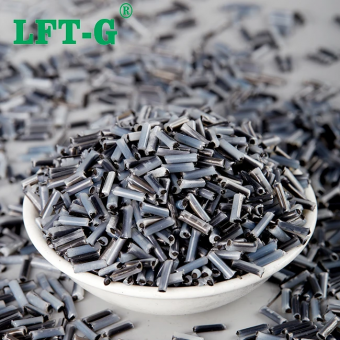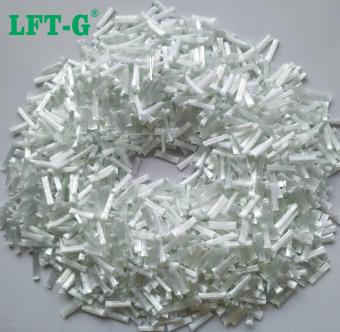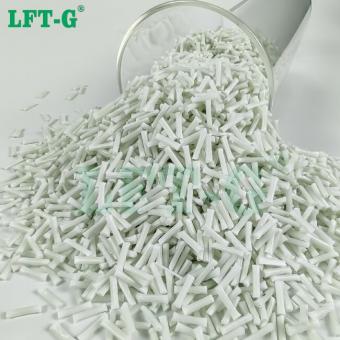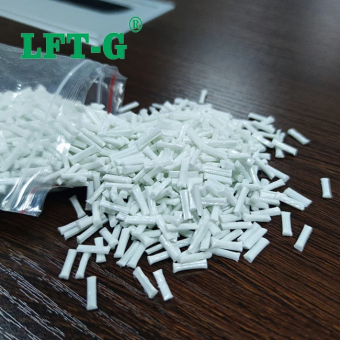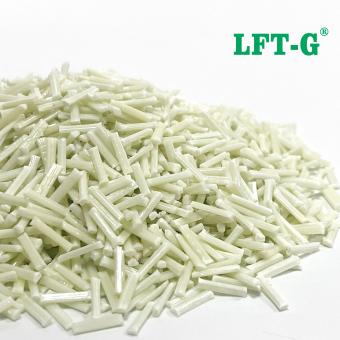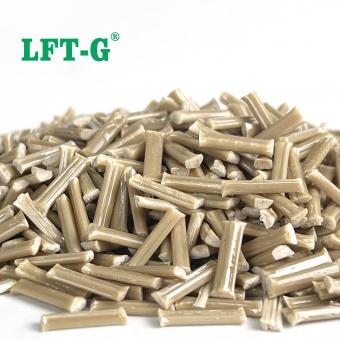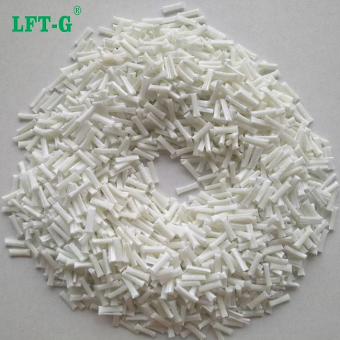-
Long Glass fiber Reinforced polylactic acid PLAPLA materials are current pioneering materials in biodegradable materials. PLA modified materials long glass fiber reinforced polylactic acid PLA are likely to become pioneers in future green materials.
- Polylactic acid Polymer
- Long Glass fiber Reinforced
- PLA LGF30
- PLA long glass fiber
- long carbon fiber with PLA
- polylactide pla long glass fiber
Tags :
-
polylactic acid PLA Glass fiber pelletsPLA materials are current pioneering materials in biodegradable materials. PLA modified materials long glass fiber reinforced polylactic acid PLA are likely to become pioneers in future green materials.view more
-
PLA lgf20 pellets recycle virgin pla resin filled long glass fiber20pla recycle polymer are become more popular around the plastic market.
- PLA reinforced thermoplastic
- PLA Glass fiber reinforced
- PLA LGF30 thermoplastic granules
- PLA granules fiber reinforced pp
- PLA gf30 pellets
Tags :
-
LFT-G PLA Polylactic acid composite long glass fiber thermoplastic resin original colorPLA PLA (polylactic acid) is also known as polylactic acid, the production process of polylactic acid is pollution-free, and the product can be biodegradable to achieve recycling in nature, so it is an ideal green polymer material, and one of the representatives of biodegradable plastics. The structure of PLA has important influence on its heat resistance, toughness, mechanical strength, degradability and biocompatibility. The influence on heat resistance is mainly discussed below. There is only one submethylene on the main chain of PLA molecule, the molecular chain has a spiral structure, and its activity is poor. As a result, the PLA after injection molding almost does not crystallize due to slow crystallization speed, so the heat resistance of the product is poor. During hot processing, the ester bond is partially broken to produce terminal carboxyl group, which plays an autocatalytic degradation effect on the thermal degradation of PLA. LGF reinforced PLA The rigidity of the fiber makes it play the role of skeleton support in the polymer matrix. When the polymer is heated, the movement of the chain segment is limited, thus improving the heat resistance of the material. At present, the fibers that can be used for enhancement modification of PLA include natural plant fiber (sisal, flax, linen, bamboo, coconut, wood fiber, etc.), natural animal fiber (silk, etc.), mineral fiber (basalt fiber, etc.), and chemical fiber (carbon fiber, glass fiber, etc.). Among these fibers, carbon fiber and glass fiber are widely used for their high strength and high modulus. Natural plant fiber has been widely studied because of its wide source, degradability and improved thermal and mechanical properties of composites. Modified natural fiber and modified inorganic fiber (glass fiber or carbon fiber) were mixed into the PLA matrix to prepare two kinds of fiber reinforced PLA composites. The test results show that the Vica softening temperature of the composites exceeds 140℃. Compared with Short fiber(SGF) Compared with the short fiber, it has more excellent performance in mechanical properties. It is more suitable for large products and structural parts. It has 1-3 times higher (toughness) than short fiber, and the tensile strength (strength and rigidity) is increased by 0.5-1 times. Injection molding Lab Warehouse Certification Xiamen LFT composite plastic Co., Ltd Xiamen LFT composite plastic Co., Ltd. is a brand-name company that focuses on LFT&LFRT. Long Glass Fiber Series (LGF) & Long Carbon Fiber Series (LCF). The company's thermoplastic LFT can be used for LFT-G injection molding and extrusion, and can also be used for LFT-D molding. It can be produced according to customer requirements: 5~25mm in length. The company's long-fiber continuous infiltration reinforced thermoplastics have passed ISO9001&16949 system certification, and the products have obtained lots of national trademarks and patents.
- PLA composite plastic
- polyactic acid materials
- modified pla compounds
- pla long glass fiber lgf
- long glass fiber filling pla
- lft-g pla lgf
Tags :
-
Xiamen LFT-G PLA Polylactic acid composite long glass fiber filling thermoplastic resin original colorPLA PLA (polylactic acid) is also known as polylactic acid, the production process of polylactic acid is pollution-free, and the product can be biodegradable to achieve recycling in nature, so it is an ideal green polymer material, and one of the representatives of biodegradable plastics. The structure of PLA has important influence on its heat resistance, toughness, mechanical strength, degradability and biocompatibility. The influence on heat resistance is mainly discussed below. There is only one submethylene on the main chain of PLA molecule, the molecular chain has a spiral structure, and its activity is poor. As a result, the PLA after injection molding almost does not crystallize due to slow crystallization speed, so the heat resistance of the product is poor. During hot processing, the ester bond is partially broken to produce terminal carboxyl group, which plays an autocatalytic degradation effect on the thermal degradation of PLA. LGF reinforced PLA The rigidity of the fiber makes it play the role of skeleton support in the polymer matrix. When the polymer is heated, the movement of the chain segment is limited, thus improving the heat resistance of the material. At present, the fibers that can be used for enhancement modification of PLA include natural plant fiber (sisal, flax, linen, bamboo, coconut, wood fiber, etc.), natural animal fiber (silk, etc.), mineral fiber (basalt fiber, etc.), and chemical fiber (carbon fiber, glass fiber, etc.). Among these fibers, carbon fiber and glass fiber are widely used for their high strength and high modulus. Natural plant fiber has been widely studied because of its wide source, degradability and improved thermal and mechanical properties of composites. Modified natural fiber and modified inorganic fiber (glass fiber or carbon fiber) were mixed into the PLA matrix to prepare two kinds of fiber reinforced PLA composites. The test results show that the Vica softening temperature of the composites exceeds 140℃. Compared with Short fiber(SGF) Compared with the short fiber, it has more excellent performance in mechanical properties. It is more suitable for large products and structural parts. It has 1-3 times higher (toughness) than short fiber, and the tensile strength (strength and rigidity) is increased by 0.5-1 times. Injection molding Lab Warehouse Certification Xiamen LFT composite plastic Co., Ltd Xiamen LFT composite plastic Co., Ltd. is a brand-name company that focuses on LFT&LFRT. Long Glass Fiber Series (LGF) & Long Carbon Fiber Series (LCF). The company's thermoplastic LFT can be used for LFT-G injection molding and extrusion, and can also be used for LFT-D molding. It can be produced according to customer requirements: 5~25mm in length. The company's long-fiber continuous infiltration reinforced thermoplastics have passed ISO9001&16949 system certification, and the products have obtained lots of national trademarks and patents.
- PLA composite plastic can be recycled
- polyactic acid materials injection molding
- pla long glass fiber reinforced plastic resin
- long glass fiber filling pla sample available
- lft-g pla lgf low warpage
Tags :
-
LFT-G PLA Polylactic acid composite long glass fiber thermoplastic original colorPLA PLA (polylactic acid) is also known as polylactic acid, the production process of polylactic acid is pollution-free, and the product can be biodegradable to achieve recycling in nature, so it is an ideal green polymer material, and one of the representatives of biodegradable plastics. The structure of PLA has important influence on its heat resistance, toughness, mechanical strength, degradability and biocompatibility. The influence on heat resistance is mainly discussed below. There is only one submethylene on the main chain of PLA molecule, the molecular chain has a spiral structure, and its activity is poor. As a result, the PLA after injection molding almost does not crystallize due to slow crystallization speed, so the heat resistance of the product is poor. During hot processing, the ester bond is partially broken to produce terminal carboxyl group, which plays an autocatalytic degradation effect on the thermal degradation of PLA. LGF reinforced PLA The rigidity of the fiber makes it play the role of skeleton support in the polymer matrix. When the polymer is heated, the movement of the chain segment is limited, thus improving the heat resistance of the material. At present, the fibers that can be used for enhancement modification of PLA include natural plant fiber (sisal, flax, linen, bamboo, coconut, wood fiber, etc.), natural animal fiber (silk, etc.), mineral fiber (basalt fiber, etc.), and chemical fiber (carbon fiber, glass fiber, etc.). Among these fibers, carbon fiber and glass fiber are widely used for their high strength and high modulus. Natural plant fiber has been widely studied because of its wide source, degradability and improved thermal and mechanical properties of composites. Modified natural fiber and modified inorganic fiber (glass fiber or carbon fiber) were mixed into the PLA matrix to prepare two kinds of fiber reinforced PLA composites. The test results show that the Vica softening temperature of the composites exceeds 140℃. Compared with Short fiber(SGF) Compared with the short fiber, it has more excellent performance in mechanical properties. It is more suitable for large products and structural parts. It has 1-3 times higher (toughness) than short fiber, and the tensile strength (strength and rigidity) is increased by 0.5-1 times. Injection molding Lab Warehouse Certification Xiamen LFT composite plastic Co., Ltd Xiamen LFT composite plastic Co., Ltd. is a brand-name company that focuses on LFT&LFRT. Long Glass Fiber Series (LGF) & Long Carbon Fiber Series (LCF). The company's thermoplastic LFT can be used for LFT-G injection molding and extrusion, and can also be used for LFT-D molding. It can be produced according to customer requirements: 5~25mm in length. The company's long-fiber continuous infiltration reinforced thermoplastics have passed ISO9001&16949 system certification, and the products have obtained lots of national trademarks and patents.view more
-
Xiamen LFT Polylactic acid compounds filled long glass fiber thermoplastic resinPLA PLA (polylactic acid) is also known as polylactic acid, the production process of polylactic acid is pollution-free, and the product can be biodegradable to achieve recycling in nature, so it is an ideal green polymer material, and one of the representatives of biodegradable plastics. The structure of PLA has important influence on its heat resistance, toughness, mechanical strength, degradability and biocompatibility. The influence on heat resistance is mainly discussed below. There is only one submethylene on the main chain of PLA molecule, the molecular chain has a spiral structure, and its activity is poor. As a result, the PLA after injection molding almost does not crystallize due to slow crystallization speed, so the heat resistance of the product is poor. During hot processing, the ester bond is partially broken to produce terminal carboxyl group, which plays an autocatalytic degradation effect on the thermal degradation of PLA. LGF reinforced PLA The rigidity of the fiber makes it play the role of skeleton support in the polymer matrix. When the polymer is heated, the movement of the chain segment is limited, thus improving the heat resistance of the material. At present, the fibers that can be used for enhancement modification of PLA include natural plant fiber (sisal, flax, linen, bamboo, coconut, wood fiber, etc.), natural animal fiber (silk, etc.), mineral fiber (basalt fiber, etc.), and chemical fiber (carbon fiber, glass fiber, etc.). Among these fibers, carbon fiber and glass fiber are widely used for their high strength and high modulus. Natural plant fiber has been widely studied because of its wide source, degradability and improved thermal and mechanical properties of composites. Modified natural fiber and modified inorganic fiber (glass fiber or carbon fiber) were mixed into the PLA matrix to prepare two kinds of fiber reinforced PLA composites. The test results show that the Vica softening temperature of the composites exceeds 140℃. Compared with Short fiber(SGF) Compared with the short fiber, it has more excellent performance in mechanical properties. It is more suitable for large products and structural parts. It has 1-3 times higher (toughness) than short fiber, and the tensile strength (strength and rigidity) is increased by 0.5-1 times. Injection molding Lab Warehouse Certification Xiamen LFT composite plastic Co., Ltd Xiamen LFT composite plastic Co., Ltd. is a brand-name company that focuses on LFT&LFRT. Long Glass Fiber Series (LGF) & Long Carbon Fiber Series (LCF). The company's thermoplastic LFT can be used for LFT-G injection molding and extrusion, and can also be used for LFT-D molding. It can be produced according to customer requirements: 5~25mm in length. The company's long-fiber continuous infiltration reinforced thermoplastics have passed ISO9001&16949 system certification, and the products have obtained lots of national trademarks and patents.
- PLA composite plastic instead metal and steel
- polyactic acid materials High quality and strength
- pla long glass fiber lgf made in China
- long glass fiber filling pla long fiber glass
- lft-g pla lgf thermoplastic resin virgin
Tags :

 e-mail
e-mail English
English français
français Deutsch
Deutsch русский
русский italiano
italiano español
español português
português العربية
العربية 日本語
日本語 한국의
한국의 中文
中文





